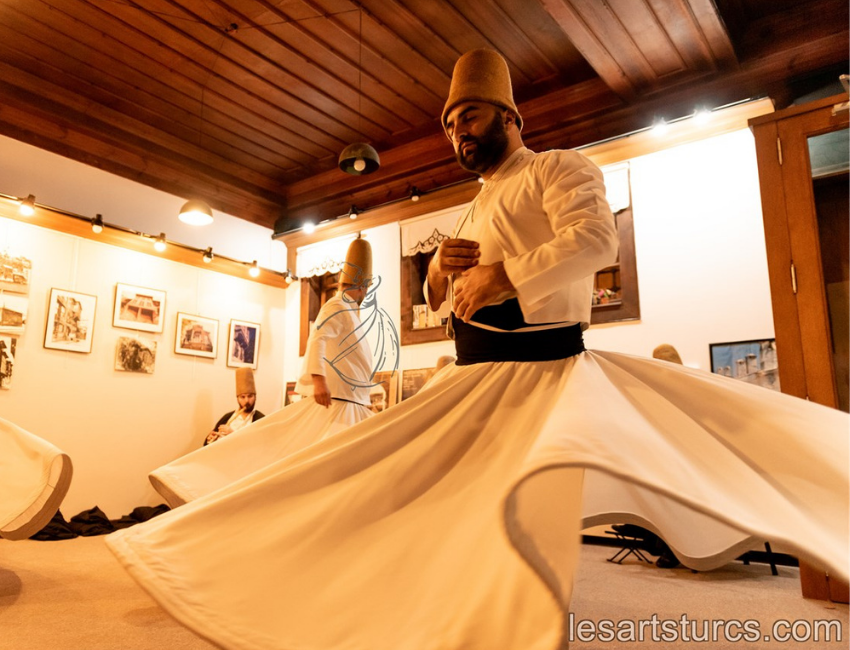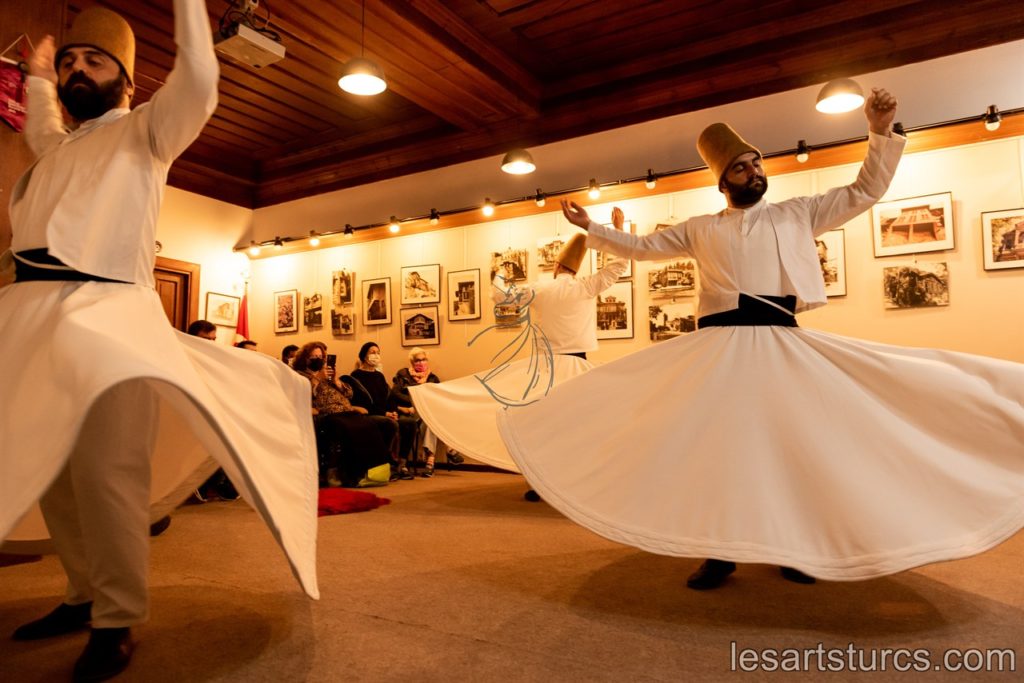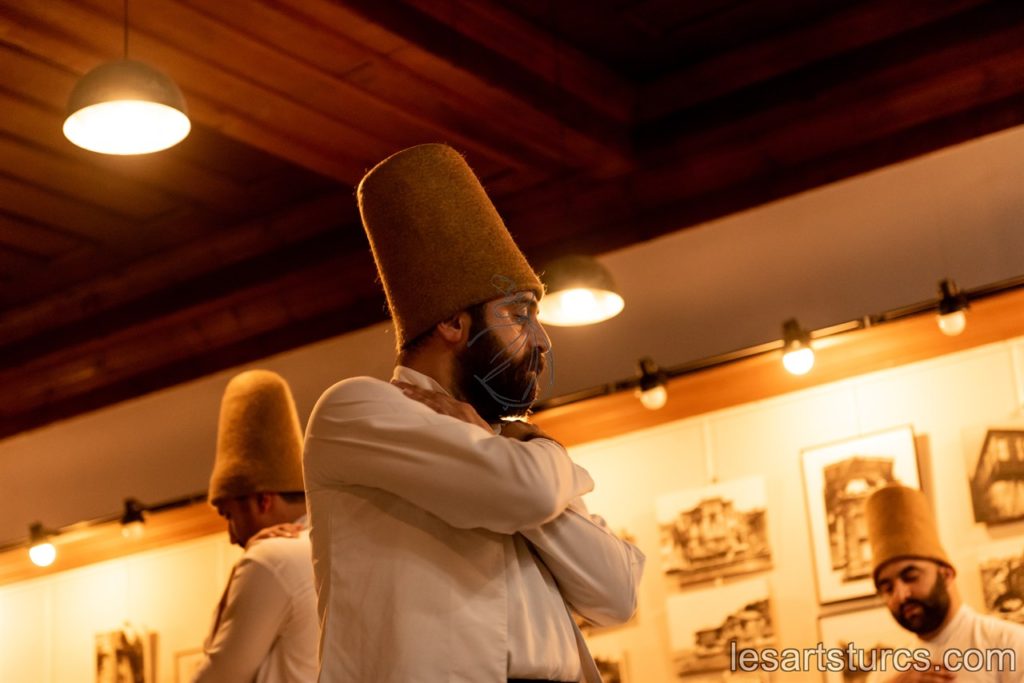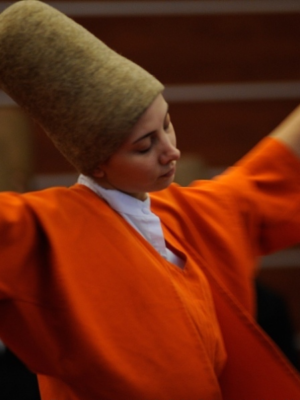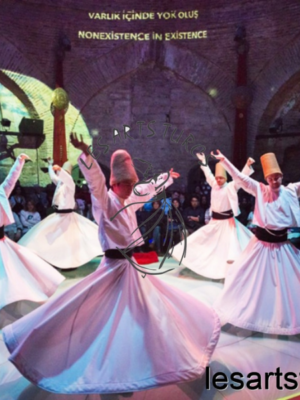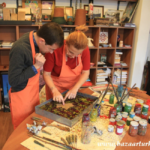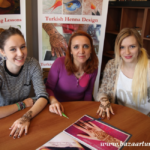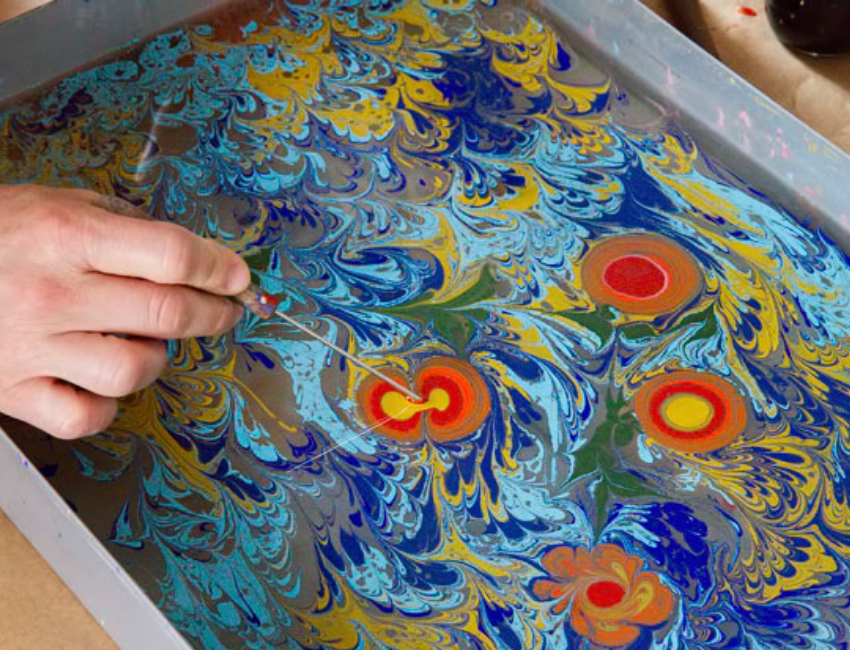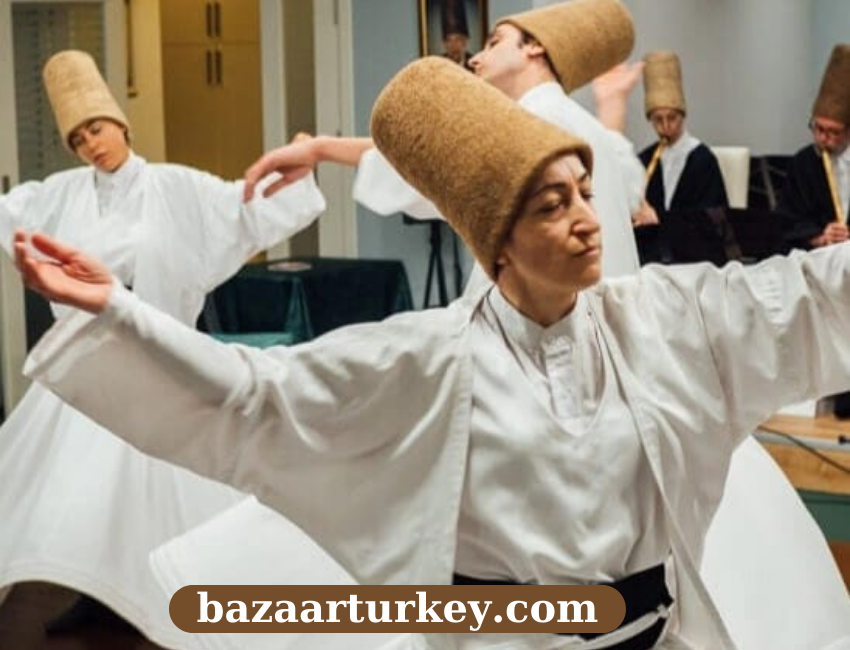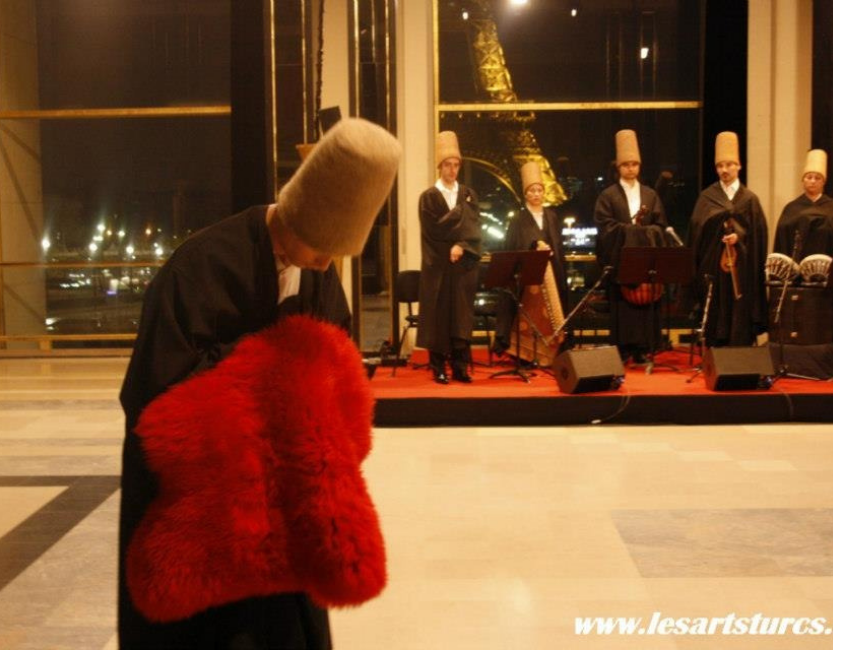It was a highly unlikely bestseller: a book of poems written by a 13th century Islamic mystic. But Jallaludin Rumi is big business in the US, and the bandwagon that has been gathering speed over there is about to roll into Britain
Peter Culshaw
Saturday December 1, 2001
The Guardian
It was in a carpet shop deep in the Istanbul bazaar that I first realised there was something of a phenomenon happening around Jallaludin Rumi, the 13th century Islamic mystic poet and founder of the Mevlani Sufi order, better known as the whirling dervishes. Perusing rugs one afternoon, I ran into Omar Kaczmarczyk (pronounced very nearly like his nickname, “Cash My Cheque”), an A-list Hollywood producer who makes Superman sequels and the like, who told me that Rumi was the bestselling poet in North America, that simply everyone was reading him and that he intended to make an epic biopic about him. The fact that Rumi was shifting in huge quantities in the US – and continues to sell post-September 11 – was startling enough, but the notion of a big-budget Hollywood movie of his life seemed surreal. I was in the carpet shop owned by Ahmed, a well-known dervish, because I’d been hugely impressed by the sheer passion of Sufi music, much of which is trance music, its aim being to heal, transform and connect to the divine. It includes the Qawaals in Pakistan, whose best known exponent, Nusrat Fateh Ali Khan, was, before his untimely death at the age of 49, a kind of world music Pavarotti. But I’d come across other forms of Sufi music, too: wild Aissawa trance drummers in Fes; strange, 100-year-old recordings from central Asia; intense and beautiful singers such as Abida Parveen in Pakistan; African Sufi chanting in Senegal, and even avant garde experimental Sufis in Indonesia.
It was the richness of this music and poetry that had drawn me to examine the philosophy behind Sufism. Defining it is difficult. One dervish told me, “That’s like trying to describe the colour red.” One version is that the Sufis, or dervishes, are simply the mystics of Islam, but many practitioners feel Sufism approaches the core of all religions. Its lack of dogma and inclusiveness has always attracted poets, musicians and artists, and no doubt is one reason for Rumi’s appeal in the west. Many Sufis in history were wild characters, such as the 8th-century saint Rabia, a woman who went through the streets of Basra in Iraq with a torch in one hand to set fire to heaven and a bucket of water in the other to douse the fires of hell, “So no one worships God for fear of hell or greed of heaven.”
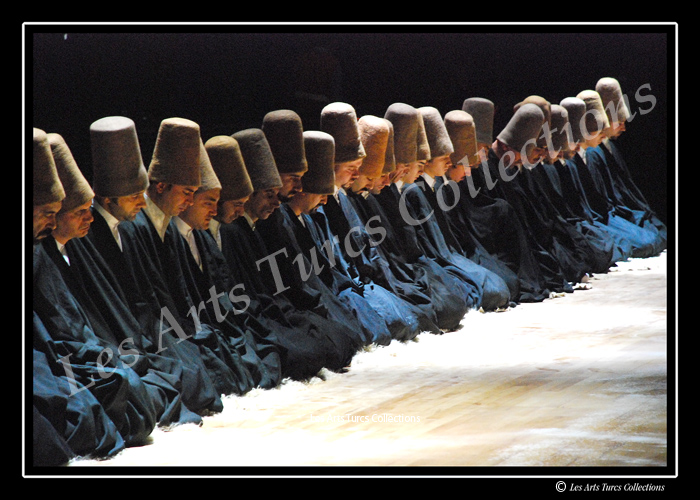 | 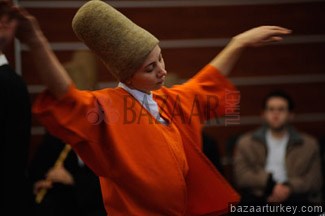 | 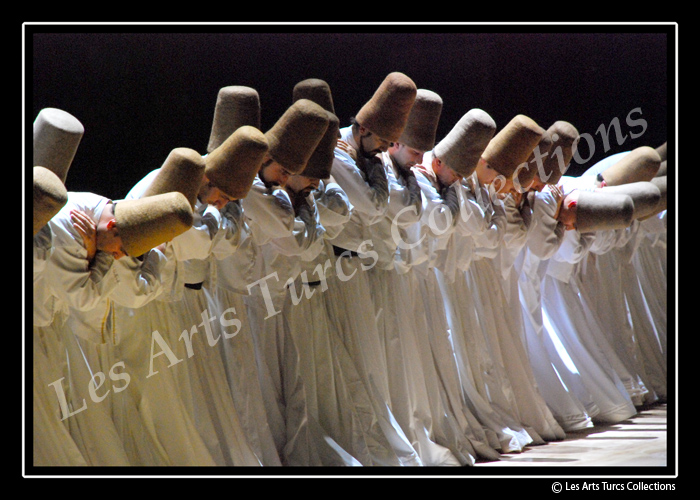 |
Several Sufis said that the time was approaching when their esoteric knowledge, their maps of the unconscious, accumulated over centuries, would be spread to the west, which was now a spiritual desert. While the west has been developing its technological prowess, the dervishes have developed a sophisticated type of inner technology, their practices a way of moving towards self-realisation.
I’d been told that some of the dervishes of Istanbul, followers of Rumi, were among the most advanced Sufis. Sufism’s appeal to direct experience is often seen as subversive, bypassing man-made religious institutions, reaching the divine through the help of a sheikh or Sufi teacher. In one poem, Rumi says we should look for God in our hearts, rather than in a church, temple or mosque. What I was looking for was access to a dervish ceremony. Some are open to the public, but others remain illegal and secretive, and Kaczmarczyk and I were hoping Ahmed would take us to some of these.
Kaczmarczyk told me his film would look at the intense relationship between Rumi and his mentor, Shams of Tabriz, who inspired most of his poetry and who disappeared in mysterious circumstances. (There are those who think it was a gay relationship, though this is fiercely denied by Islamicists.) As for who would be writing the screenplay, “It’s gotta be Coleman Barks,” Kaczmarczyk drawled. “It’s like Rumi flows through him. The guy is awesome.”
Coleman Barks never used to be awesome, at least not so as many people would notice. For years he was professor of poetry at Georgia University. In the 1970s, his friend, the poet Robert Bly, gave him some academic translations of Rumi and said, “These poems need to be released from their cages.” For seven years, Barks worked on the translations, only then publishing a couple of slim volumes with a small New England press. But when Harper San Francisco published a selection, The Essential Rumi, the book went like a rocket, selling more than half a million copies, an astonishing amount for poetry, making Rumi the bestselling poet in the US. The bandwagon was rolling.
Deepak Chopra, one-time endocrinologist and now New Age guru to the stars, roped in some showbiz pals, including Madonna and Demi Moore, to record a Rumi CD, A Gift Of Love. Donna Karan staged a fashion show at which Rumi was read as the world’s supermodels sashayed down the catwalk. A greetings card company contacted Barks to suggest a Rumi day, video artist Bill Viola took to quoting Rumi as an inspiration, and Philip Glass set to music Barks’s translations of Rumi in a stage show entitled Monsters Of Grace.
Barks, meanwhile, released Poet Of The Heart, a video of himself and Chopra reading Rumi, with an introduction by Debra Winger, and has his own idea for a movie. But he isn’t the only Rumi translator on a career high. Shahram Shiva can be seen reading Rumi every Thursday at midnight on cable TV in New York. He has also developed a Four-Step Method To Whirling “based on the common gravitational laws of the universe”, which is perfect for cash-rich, time-poor Americans.
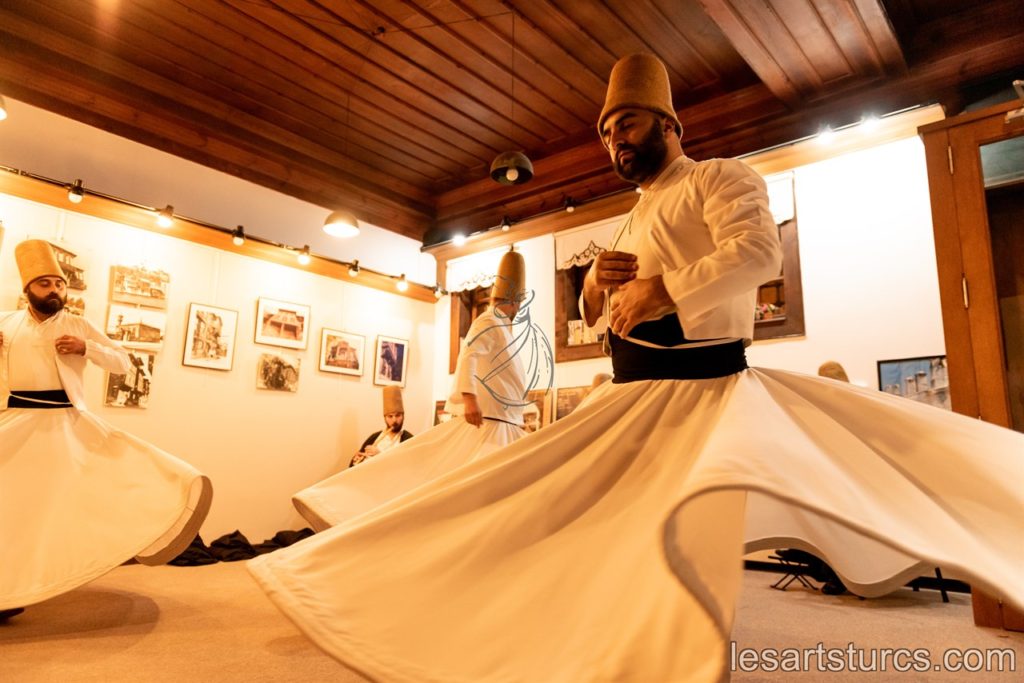
The Rumi bandwagon could be starting to roll in the UK, too. A new translation by Raficq Abdulla has appeared here, and a bunch of Rumi enthusiasts called ArRum have just opened a club in Clerkenwell, London, for a hip young Muslim crowd. It has a juice bar, fountain and fireplace (but no alcohol, of course) and Rumi readings are a regular feature.
When Barks performed his Rumi translations on a rare trip to London, at a multi-faith extravaganza called Music Village, held in Islington, he received a rapturous response. This, he believes, proves that there is a “great thirst for the ecstatic and the gnostic in the west. Robert Bly suggested to me that this is one main reason for the interest in Rumi. He says that in our sacred texts such as the Bible, those elements were cut out, at the council of Nicea in the third century, for example, and we’ve been lonesome for this ecstatic material ever since.”
But is this interest in Sufism just a fad? “Maybe,” Barks says, “but it doesn’t feel that way. It hasn’t got that shiny, frivolous T-shirt thing. It’s more than Hula Hoops.” So what does he make of the Madonna and Donna Karan manifestations of Rumi? “It does feel like a dilution. The attunement to Rumi isn’t as deep as I’d like, but maybe it’s a way of introducing Rumi to a wider audience, so it’s good and bad. Maybe some 17-year-old in the midwest will latch on to it, and his life will be changed.” He pauses. “And what I do may be a distortion of Rumi. As the French say, all translation is betrayal.”
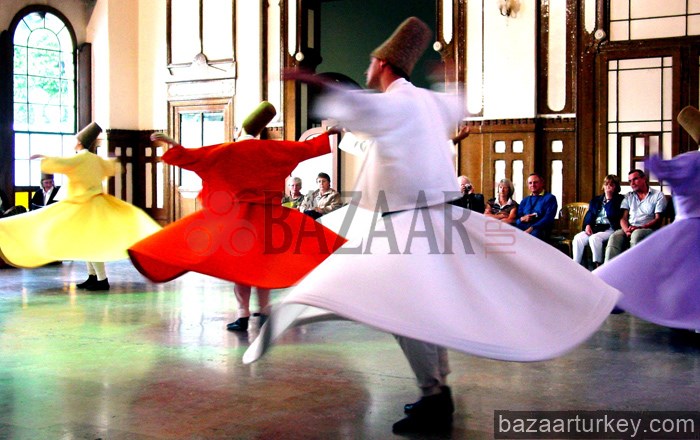
If there is a controversial aspect of Barks’s take on Rumi, it’s that he views him as a bridge between faiths rather than as the specifically Islamic poet that Muslim scholars see. “There’s a lot of discussion about that right now,” Barks says. “Rumi is certainly important in many different cultures, and had followers of different faiths in his lifetime. I see him as someone who kicked free of doctrinal confinement and got to the core from which we all worship. I think he saw these God clubs as divisive. Others may see him differently.”
Rumi used the language of romance, but was often outrageous – many poems are about sexual love or drunkenness; and there’s also a sense of ambiguity and frisson of the forbidden, common to much Sufi poetry. Early last century, some poems were translated only into Latin, to protect delicate sensibilities. One is the story of an effeminate looking man who, because of his looks, gets a job in a female bath-house and spends all day in a permanent state of excitement massaging women. Only when he is nearly discovered is he forced to rethink the way he lives his life. Another is a symbolic parable about two women who have sex with a donkey.
“I think Rumi just loved the variety of people’s desires and the absurdity of them,” Barks says. “There’s a surrealist poem about a fish wanting linen shirts. It certainly gives him a Shakespearean variation of metaphor. He uses the language of romance from the Provençal tradition, from India and North Africa, and explodes those traditions into a new type of love poem, where there is no synapse between lover and beloved. It may be that only now, 700 years later, are we beginning to understand him.”
Rumi has always been a major figure in the east. As Andrew Harvey, novelist and author of The Way Of Passion: A Celebration Of Rumi, points out: “His odes have been chanted by crowds on pilgrimages for centuries and sung with the highest reverence, from Tangier to Cairo, Lahore and Sarajevo, into the humblest, most remote villages of Afghanistan, Turkey, Iran and India. No other poet in history, not even Shakespeare or Dante, has had so exalted and comprehensive an impact.”
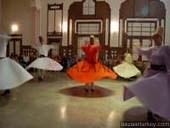 | 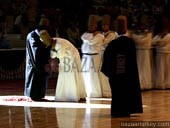 | 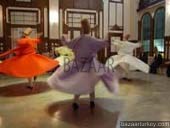 |
Harvey believes Rumi will help lead the west out of its capitalist, consumerist nihilism. He sees Rumi as “an essential guide to the new mystical renaissance that is struggling to be born today. He is the spiritual inspiration for the 21st century.” But he warns against seeing Rumi as “a Jerry Garcia of the Sacred Heart”.
Rumi is acceptable to the liberal US establishment, even if they have put him in exotic soft focus, down playing his radicalism. Many among Rumi’s new audience are New Agers in search of something a little more “real”. Rumi is part of a tried and tested Sufi tradition, and Barks’s version of him as a bridge between religions appeals to those who see themselves as “spiritual” but who are also critical of established creeds and unwilling to sign up for any particular orthodoxy.The Rumi cult is a further sign of a strong appetite for culture that appears not to be commercialised (witnessed in everything from million-selling books on Tibetan Buddhism to the Buena Vista Social Club), even if there is a sophisticated marketing push behind the poet. According to Barks’s lawyer, the archetypal Rumi buyer is a 34-year-old, college-educated woman – the spiritual end of the Bridget Jones market. But there is no doubt that Rumi has become a key figure in the States, a talisman of the authentic – in dialectical opposition to the virtual, the packaged, the karaoke, and an important figure for the anti-globalisation generation.
But the west’s fascination with Rumi and Sufi writing isn’t entirely new. The Rubaiyat Of Omar Khayyam was a hit more than 100 years ago in Edward Fitzgerald’s translation. The more mystical British poets have always been aware of Rumi and other Sufi writers. Robert Graves wrote the introduction to Idries Shah’s book The Sufis, which was reviewed at length by Ted Hughes, who said, “The Sufis are the most sensible collection of people on earth.” Richard Burton, Victorian explorer and translator of erotic classics the Kama Sutra and The Perfumed Garden, was initiated as a dervish, while Doris Lessing is the highest profile modern novelist who has followed the Sufi path. In an essay on Idries Shah, she explained its attraction: “Sufi truth is at the core of every religion, its heart, and religions are only the outward vestments of an inner reality.”
But merely reading about this is not enough, according to many Sufis; it’s the spiritual equivalent of going to a restaurant and trying to eat the menu. “The real essential Rumi,” Barks told me, “is the Zikr, a ritual of remembrance of Allah.” It was this I felt I had to see, this that had brought me to Ahmed’s carpet shop.
Finding private dervish ceremonies is not easy – officially they are illegal, though they are tolerated as long as they remain low profile. I had already witnessed the largest dervish ceremony, the annual celebration of Rumi’s death (his “wedding night”, when he said he was to be married to the eternal). In subzero temperatures in a baseball stadium in Konya, Anatolia, where Rumi had lived for decades before he died in 1273, 50 dervishes whirled in front of a couple of thousand people, including a busload of Japanese tourists. After the ceremony, in private houses in Konya, wilder, more amateur forms of dervish parties take place.
But I wanted to experience the real stuff, the Zikr of which Barks talked, which is how I found myself among 80 dervishes in a small, hidden tekke
religious house) off a side street in Istanbul, its wooden interior like that of a ski lodge. After about an hour of different songs, the dervishes began to lean forward rhythmically and chant the name of Allah – speeding up like an express train. A violin and zither sent chills down my spine, and out of nowhere emerged a solo voice full of heartbreaking longing, similar to the muezzin’s call from the minarets. This was serious blues music. I was given permission to take photographs, but I couldn’t get up, pinned back by the numbers and by what seemed like the sheer energy of the spiritual force field. Then 12 dervishes filed into the back of the room, took off their black cloaks and started spinning with incredible lightness and grace, their angelic whirling a perfect counterpoint to the earthy chanting. Nothing had prepared me for the disorienting feeling that the dervishes were defying gravity. Like much of Rumi and Sufism in general, the performance was heavy with symbolism – the funereal black cloak is a tomb and in casting this off, the dervishes discard all worldly ties. They spin with their right arms extended to heaven and their left arms to the floor. Grace is received from Allah and distributed to humanity. The dancers themselves represent the heavenly bodies circling the sun, who is their sheikh, the spiritual leader.
Most followers of these sheikhs have stories about their psychic powers, stories I treated with scepticism, until they seemed to be confirmed when my translator went white at one point in the discussion after the ceremony. The dervishes often bring their dreams to be interpreted by the sheikh and this man told me the sheikh had just read out the text of a 15th century poem and explained it. The poem, he said, was in detail what he had dreamt of the previous night. Others, however, told me not to be distracted by such apparent psychic powers: “The real miracle is the joy.”
Afterwards, I met the sheikh, who said his name was Sultan Veled (not his real name but, the name of Rumi’s son), and I asked him what the Zikr meant. He said, “Zikr means remembrance. The purpose of life is to remember Allah. Every electron and proton is whirling around a nucleus, as the planets whirl around the sun – and all of them are chanting for Allah. Even your heartbeat” – and here he thumped his chest – “is chanting Al-lah, Al-lah.”
I went out into the cold Istanbul air and walked by the Bosphorus. As the city lights sparkled on the river, I felt I’d experienced something of the power of Rumi, amazed that his presence should seem so alive eight centuries and 20 generations after his death. I’d been brought up to be wary of such passion, but I still envied them their longing, their sense of brotherhood, their faith. Right now, though, I needed a drink.
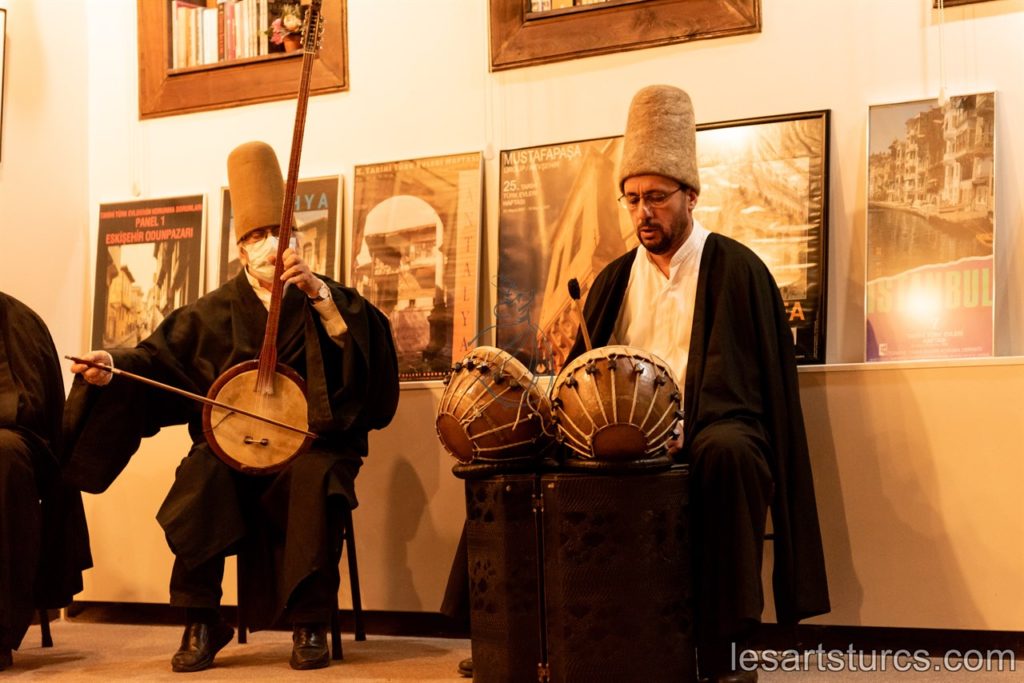
Bazaar Turkey – Les Arts Turcs Art Studio
Alemdar Mh. Incili Cavus St.
No: 19 Floor : 3 (Behind The Underground Cistern)
Sultanahmet 34110
Istanbul, Turkey
Contact : Mr. Alp or Mr. Nurdogan ( Phone : +90 544 220 10 22 )
E-mail : info@bazaarturkey.com
Google Maps : https://goo.gl/maps/uXuyRmELZsx

